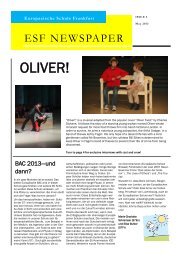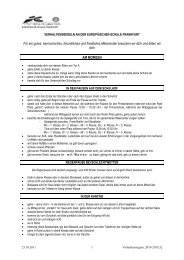Anti-bullying-policy - Europäische Schule Frankfurt am Main
Anti-bullying-policy - Europäische Schule Frankfurt am Main
Anti-bullying-policy - Europäische Schule Frankfurt am Main
Create successful ePaper yourself
Turn your PDF publications into a flip-book with our unique Google optimized e-Paper software.
European School <strong>Frankfurt</strong><br />
ANTI-BULLYING<br />
POLICY<br />
2011 – 2012<br />
"Everyone has the right to be respected<br />
and the responsibility to respect others"<br />
European School <strong>Frankfurt</strong> <strong>Anti</strong>-<strong>bullying</strong> <strong>policy</strong> 03/06/2012<br />
Page 1
1. Introduction<br />
1.1 Statement of Intent<br />
1.2 Objectives of this Policy<br />
1.3 What Is Bullying?<br />
1.4 Why is it Important to Respond to Bullying?<br />
1.5 Signs and Symptoms<br />
2. Approach<br />
2.1 Procedures<br />
2.2 Strategies<br />
3. Prevention<br />
4. Annexes<br />
4.1 Report Forms in each language<br />
4.2 Mediation approaches and techniques<br />
4.3 Ways of Bullying<br />
4.4 Letters<br />
4.5 More information<br />
4.6 Sources for this document<br />
European School <strong>Frankfurt</strong> <strong>Anti</strong>-<strong>bullying</strong> <strong>policy</strong> 03/06/2012<br />
Page 2
1. Introduction<br />
1.1 Statement of Intent<br />
The European School of <strong>Frankfurt</strong> is committed to providing a caring, friendly and<br />
safe environment for all of our pupils so they can learn in a relaxed and secure<br />
atmosphere.<br />
Bullying of any kind is unacceptable at our school and will not be tolerated.<br />
If <strong>bullying</strong> does occur, all pupils should be able to tell and know that incidents will be<br />
dealt with promptly and effectively.<br />
We are a “TELLING” school. This means that anyone who knows that <strong>bullying</strong> is<br />
happening is expected to tell the staff.<br />
1.2 Objectives of this Policy<br />
• Teaching and non-teaching staff, pupils and parents should have an<br />
understanding of what <strong>bullying</strong> is.<br />
• Teaching and non-teaching staff should know what the school <strong>policy</strong> is on<br />
<strong>bullying</strong>, and follow it when <strong>bullying</strong> is reported.<br />
• All pupils and parents should know what the school <strong>policy</strong> is on <strong>bullying</strong>, and<br />
what they should do if <strong>bullying</strong> arises.<br />
• As a school we take <strong>bullying</strong> seriously. Pupils and parents should be assured<br />
that they will be supported when <strong>bullying</strong> is reported.<br />
1.3 What Is Bullying?<br />
Bullying is the use of aggression (both physical and psychological) with the intention<br />
of hurting another person. Bullying results in pain and distress to the victim.<br />
Bullying can be:<br />
• Emotional being unfriendly, excluding, tormenting (e.g. hiding books,<br />
threatening gestures)<br />
• Non-verbal looks, gestures, facial expressions, body language that seek to<br />
hurt or exclude<br />
• Physical pushing, kicking, hitting, punching or any use of violence<br />
• Racist racial taunts, graffiti, gestures<br />
• Sexual unwanted physical contact or sexually abusive comments<br />
• Homophobic because of, or focussing on the issue of sexual identity<br />
• Verbal n<strong>am</strong>e-calling, sarcasm, spreading rumours, teasing<br />
• Cyber All areas of internet, such as email & internet chat room misuse<br />
Mobile threats by text messaging & calls<br />
Misuse of associated technology , i.e. c<strong>am</strong>era &video facilities<br />
Boys and girls bully in different ways but both can be skilled manipulators, often lying<br />
their way out of situations and turning the tables on their victims.<br />
European School <strong>Frankfurt</strong> <strong>Anti</strong>-<strong>bullying</strong> <strong>policy</strong> 03/06/2012<br />
Page 3
1.4 Why is it Important to Respond to Bullying?<br />
Bullying hurts. No one deserves to be a victim of <strong>bullying</strong>. Everybody has the right to<br />
be treated with respect.<br />
Pupils who are <strong>bullying</strong> need to learn different ways of behaving.<br />
We have a responsibility to respond promptly and effectively to issues of <strong>bullying</strong>.<br />
Bullying can hinder a child’s social and psychological development.<br />
1.5 Signs and Symptoms<br />
A child may indicate by signs or behaviour that he or she is being bullied. Adults<br />
should be aware of these possible signs and that they should investigate if a child:<br />
• is frightened of walking to or from school<br />
• doesn't want to go on the school / public bus<br />
• begs to be driven to school<br />
• changes their usual routine<br />
• is unwilling to go to school (school phobic)<br />
• begins to truant<br />
• becomes withdrawn anxious, or lacking in confidence<br />
• starts st<strong>am</strong>mering<br />
• attempts or threatens suicide or runs away<br />
• cries themselves to sleep at night or has nightmares<br />
• feels ill in the morning/ headaches / stomaches<br />
• begins to do poorly in school work<br />
• comes home with clothes torn or books d<strong>am</strong>aged<br />
• has possessions which are d<strong>am</strong>aged or " go missing"<br />
• asks for money or starts stealing money (to pay bully)<br />
• money seems to be lost<br />
• has unexplained cuts or bruises<br />
• comes home starving (money / lunch has been stolen)<br />
• becomes aggressive, disruptive or unreasonable<br />
• is <strong>bullying</strong> other children or siblings<br />
• stops eating<br />
• is frightened to say what's wrong<br />
• gives improbable excuses for any of the above<br />
• is afraid to use the internet or mobile phone<br />
• is nervous & jumpy when a cyber message is received<br />
These signs and behaviours could indicate other problems, but <strong>bullying</strong> should be<br />
considered a possibility and should be investigated<br />
Girl <strong>bullying</strong><br />
The victim is often an ex-best friend who is suddenly excluded from sleep-overs and<br />
social events. In happier times she will have shared confidences with the bully who<br />
uses that information against her.<br />
Rumours and hurtful gossip are spread to mutual friends and the victim is deliberately<br />
isolated, spending break on her own and having nobody to partner her in class.<br />
European School <strong>Frankfurt</strong> <strong>Anti</strong>-<strong>bullying</strong> <strong>policy</strong> 03/06/2012<br />
Page 4
If she's a teenager she may get abusive text messages including death threats or she<br />
might be called n<strong>am</strong>es alleging she is gay.<br />
Girl bullies can be vicious and quick to turn a perceived slight into an opportunity for a<br />
fight. They are often motivated by jealousy. Friendships can be volatile and a<br />
temporary falling out can quickly escalate. Bullying also includes negative references<br />
to appearance eg clothing, skin, hair,etc.<br />
Boy <strong>bullying</strong><br />
The victim is often quiet and inoffensive and lacking confidence which may lead to<br />
him being called gay, particularly if he is also popular with girls. Younger boys tend to<br />
be targeted with violence in the playground which is laughed off as horseplay while<br />
older ones can be targeted during g<strong>am</strong>es lessons when there is little supervision in<br />
the changing room.<br />
Boys often find they are the butt of jokes and it's particularly hurtful when their friends<br />
join in.<br />
They find that their friends go along with <strong>bullying</strong> which sends a mixed message and<br />
they're not sure when to laugh it off and when they need to ask for help from a parent<br />
or teacher. Boys are often reluctant to report <strong>bullying</strong>, feeling that they should be able<br />
to handle it themselves.<br />
Issues which affect boys and girls<br />
Both boys and girls are likely to be targeted on abusive internet websites which may<br />
contain pictures of them with offensive comments.<br />
European School <strong>Frankfurt</strong> <strong>Anti</strong>-<strong>bullying</strong> <strong>policy</strong> 03/06/2012<br />
Page 5
2. Approach<br />
Nobody should suffer in silence. When a case of <strong>bullying</strong> is noticed help must be<br />
asked for immediately:<br />
2.1 Procedures<br />
Reporting the <strong>bullying</strong><br />
for pupils who see <strong>bullying</strong> taking place:<br />
• the pupil could try to talk with both bully and victim<br />
• the pupil advises the victim to ask for help<br />
• the pupil asks for help<br />
• the pupil tells his parents<br />
for teachers:<br />
• the teacher solves the problem himself/herself by using, for ex<strong>am</strong>ple, the “No<br />
bl<strong>am</strong>e approach” or other mediation techniques (see Annex II)<br />
• teachers should discuss possible steps to be taken with the student<br />
• the teacher must inform the student that they might discuss their case with the<br />
counselling te<strong>am</strong> or pedagogical advisor<br />
• the teacher must report all cases to the management and/or the<br />
pedagogical advisers. These reports are internal and confidential (for written<br />
reports, see Annex III).<br />
• the teacher can ask for the intervention of a counselling teacher or an outside<br />
psychologist for professional help<br />
• the teacher contacts the parents if necessary<br />
• the teacher checks at different times to make sure that the problem has been<br />
solved<br />
for parents:<br />
• the parents are encouraged to contact the school (class teacher, counselling<br />
teacher, pedagogical adviser, nurse, management) when they are confronted<br />
with or have the suspicion that their children are implicated in a <strong>bullying</strong><br />
episode<br />
• the parent talks with his/her child<br />
• parents are encouraged to work with the school to overcome the problem.<br />
Outcomes<br />
• The bully (bullies) may be asked to genuinely apologise.<br />
• If possible, the pupils will be reconciled.<br />
• Arrange for a bullied pupil to have a playground buddy.<br />
• In serious cases, the pedagogical advisors will investigate the matter<br />
further and management will consider what actions are necessary.<br />
• After the incident / incidents have been investigated and dealt with, each<br />
case will be monitored to ensure repeated <strong>bullying</strong> does not take place.<br />
European School <strong>Frankfurt</strong> <strong>Anti</strong>-<strong>bullying</strong> <strong>policy</strong> 03/06/2012<br />
Page 6
2.2 Strategies for teachers<br />
• Give Reassurance<br />
If a pupil comes to you to say they are being bullied you should talk to them privately.<br />
This allows the victim to feel safe and will stop anyone seeing or hearing what is<br />
being discussed.<br />
If that isn't possible then explain to the pupil that you will ask them to see you at the<br />
end of school about some work so that they get the chance to discuss the problem<br />
privately without other pupils thinking that they are telling tales.<br />
Reassure the pupil that you will take the complaint seriously and that you will look<br />
into it. It's a good idea to ask the pupil to write down exactly what happened and who<br />
was there so that you can speak to other people. (There is an official report form that<br />
should be used for this.)<br />
The more information you have the better you will be able to deal with the problem<br />
and the faster you can sort out exactly what happened.<br />
Assure the victim that you will be back in touch with them as soon as you have<br />
completed your investigation and that if there are any more problems in the mean<br />
time they must let you know immediately. You could give the child your school email<br />
address to make this easier for them.<br />
Tell the pupil when you expect to be able to speak to them again. Try not to set an<br />
unrealistic time fr<strong>am</strong>e if you know you might not be able to meet it.<br />
• How will you investigate the complaint?<br />
Explain how you will investigate the complaint, who you will be talking to, that you will<br />
need to hear both sides of the story as well as the account of the person they are<br />
saying has bullied them.<br />
When a pupil tells you that he/she is being bullied it's important to gather all the facts<br />
from both sides. This includes talking to the bully and any witnesses.<br />
Bullies will often not act alone and it's important to remember that you may be<br />
dealing with a number of pupils who are friends and who may give similar versions of<br />
events that differ to that of the victim.<br />
You will know from your own experience of the students who is friends with who and<br />
can use this as a way of assessing the accuracy of what you are being told.<br />
• How to find out the real story<br />
Try to interview the pupils accused of <strong>bullying</strong> in such a way that they don't have the<br />
opportunity to get together to make up stories. Ask another colleague to help you to<br />
prevent this. Try to get the pupils involved to discuss how they feel about the social<br />
environment in the classroom. Don’t mention the n<strong>am</strong>e of the victim.<br />
The bully may admit an event occurred but it's worth while getting them to write it<br />
down so you can talk to them about it in more detail later.<br />
European School <strong>Frankfurt</strong> <strong>Anti</strong>-<strong>bullying</strong> <strong>policy</strong> 03/06/2012<br />
Page 7
Ask them what their friends were doing while the incident was taking place and<br />
whether any other pupils or adults were nearby.<br />
Bullies rarely admit to what they have done so just because the bullies may be 'nice'<br />
children and high achievers , coming from stable f<strong>am</strong>ily backgrounds doesn't mean<br />
that they are not <strong>bullying</strong> someone else.<br />
You should explain to the pupil that what they have done constitutes <strong>bullying</strong> and that<br />
the school has a zero tolerance of this behaviour.<br />
It's appropriate in cases where <strong>bullying</strong> is persistent, for the bully's parents to be<br />
called in to school for a discussion with the school management.<br />
European School <strong>Frankfurt</strong> <strong>Anti</strong>-<strong>bullying</strong> <strong>policy</strong> 03/06/2012<br />
Page 8
3. Prevention:<br />
We are aware that we belong to a school community made up of people from<br />
different nationalities, cultures, religions and social backgrounds.<br />
We value the differences and are unbiased by prejudice. The school climate is built<br />
on the shared basic values of tolerance and respect.<br />
Prevention is a key aspect of our anti-<strong>bullying</strong> <strong>policy</strong>. This means systematic work<br />
inside and outside the classrooms to provide a positive pedagogical atmosphere.<br />
Therefore:<br />
• Each year at least one or two activities involving several classes are<br />
organized. This is aimed at strengthening the school cohesion <strong>am</strong>ong the<br />
different age groups and language sections.<br />
• Every teacher should use some time during his/her lessons to improve the<br />
class atmosphere; (s)he should propose activities that link his/her subject<br />
matter with the passing on of values such as tolerance and respect<br />
• School trips, excursions, outings and other activities are organized to<br />
contribute to a positive social-emotional atmosphere.<br />
• More suggestions: writing stories or poems or drawing pictures about <strong>bullying</strong>,<br />
reading stories about <strong>bullying</strong> or having them read to a class, making up roleplays,<br />
having discussions about <strong>bullying</strong> and why it matters<br />
• Each year we will ensure that through the class teachers, ethic and religion<br />
teachers and counsellors, we will renew our school’s commitment to our anti<strong>bullying</strong><br />
<strong>policy</strong> (by revisiting the different types of <strong>bullying</strong> and the<br />
consequences of <strong>bullying</strong>).<br />
• Resources will be provided for ethics/religion/class teachers to use in raising<br />
awareness of <strong>bullying</strong> and its consequences.<br />
• A library of resources will be established to assist teachers (lesson ideas,<br />
DVD’s etc)<br />
European School <strong>Frankfurt</strong> <strong>Anti</strong>-<strong>bullying</strong> <strong>policy</strong> 03/06/2012<br />
Page 9
4. Annexes :<br />
4.1 Report Forms in different languages<br />
4.2 Mediation approaches and techniques<br />
4.3 Ways of Bullying<br />
4.4 Letters<br />
4.5 More information<br />
4.6 Sources for this document<br />
European School <strong>Frankfurt</strong> <strong>Anti</strong>-<strong>bullying</strong> <strong>policy</strong> 03/06/2012<br />
Page 10
4.1 Report Forms in different languages<br />
Report for a case of <strong>bullying</strong> in the school<br />
This document is to be given to the Pedagogical Advisers.<br />
Please fill in this form as precisely as possible, when<br />
a) You are or were victim of <strong>bullying</strong>.<br />
b) You were witness of this type of behaviour<br />
c) You knew a case of <strong>bullying</strong>.<br />
Person reporting the incident<br />
N<strong>am</strong>e:............................................................................................................................<br />
Address: ........................................................................................................................<br />
Email: ............................................................................................................................<br />
Telephone:.....................................................................................................................<br />
Identity of the victim<br />
Is it about a student? ....................................................................................................<br />
If yes, which class?........................................................................................................<br />
Identity of the alleged bullies<br />
Are they students in the school ?<br />
Surn<strong>am</strong>e:. N<strong>am</strong>e: ........................ Class: ...........<br />
Surn<strong>am</strong>e:. N<strong>am</strong>e: ........................ Class: ...........<br />
Surn<strong>am</strong>e:. N<strong>am</strong>e: ........................ Class: ...........<br />
Surn<strong>am</strong>e:. N<strong>am</strong>e: ........................ Class: ...........<br />
European School <strong>Frankfurt</strong> <strong>Anti</strong>-<strong>bullying</strong> <strong>policy</strong> 03/06/2012<br />
Page 11
Details of the incident(s)<br />
Date(s) and time of the incident:<br />
......................................................................................................................................<br />
Where the incident(s) happened:<br />
Inside the school. Specify:<br />
......................................................................................................................................<br />
On the way to school. Specify:<br />
......................................................................................................................................<br />
In another place. Specify:<br />
......................................................................................................................................<br />
What happened?<br />
Indicate from the list below all types of <strong>bullying</strong> that were involved :<br />
o Mockery, Insults, Humiliation<br />
o Racist Comments<br />
o Excluded from the group<br />
o Spreading of rumours<br />
o Threats and intimidation<br />
o Telephone Harassment and / or by e-mail or social networking sites<br />
o Destruction of personal objects<br />
o Personal belongings stolen<br />
o Jostled or spat at or knocked over<br />
o Encouraged others to do something<br />
o Use of weapon or dangerous objects<br />
o Others. Specify:<br />
.................................................................................................................................<br />
.................................................................................................................................<br />
European School <strong>Frankfurt</strong> <strong>Anti</strong>-<strong>bullying</strong> <strong>policy</strong> 03/06/2012<br />
Page 12
Describe exactly what happened (what was said or done by the bullies)<br />
......................................................................................................................................<br />
......................................................................................................................................<br />
......................................................................................................................................<br />
......................................................................................................................................<br />
......................................................................................................................................<br />
......................................................................................................................................<br />
......................................................................................................................................<br />
Were there witnesses?<br />
Surn<strong>am</strong>e:. N<strong>am</strong>e: ........................ .Class: ..............<br />
Surn<strong>am</strong>e:. N<strong>am</strong>e: ........................ .Class: ..............<br />
Surn<strong>am</strong>e:. N<strong>am</strong>e: ........................ .Class: ..............<br />
Surn<strong>am</strong>e:. N<strong>am</strong>e: ........................ .Class: ..............<br />
Did anyone intervene? If yes, who ?<br />
Surn<strong>am</strong>e:. N<strong>am</strong>e: ........................ .Class: ..............<br />
Surn<strong>am</strong>e:. N<strong>am</strong>e: ........................ .Class: ..............<br />
Surn<strong>am</strong>e:. N<strong>am</strong>e: ........................ .Class: ..............<br />
Surn<strong>am</strong>e:. N<strong>am</strong>e: ........................ .Class: ..............<br />
Did you speak about this attack to anyone?<br />
o Friends<br />
o Brother or sister<br />
o Parents<br />
o Teacher<br />
o Counsellor<br />
o Pedagogical Advisor<br />
o Nurse or doctor<br />
o Others<br />
If you did not tell anyone about this incident, explain why?<br />
......................................................................................................................................<br />
......................................................................................................................................<br />
European School <strong>Frankfurt</strong> <strong>Anti</strong>-<strong>bullying</strong> <strong>policy</strong> 03/06/2012<br />
Page 13
If you were the victim of <strong>bullying</strong> , what sort of help would you like?<br />
......................................................................................................................................<br />
......................................................................................................................................<br />
......................................................................................................................................<br />
Do you want to add anything?<br />
......................................................................................................................................<br />
......................................................................................................................................<br />
European School <strong>Frankfurt</strong> <strong>Anti</strong>-<strong>bullying</strong> <strong>policy</strong> 03/06/2012<br />
Page 14
4.2 Mediation approaches and techniques<br />
1. The "No Bl<strong>am</strong>e" Approach to Bullying<br />
It is a simple 7 step process that has the following four essential ingredients:<br />
• The absence of bl<strong>am</strong>e<br />
• The encouragement of empathy<br />
• Shared Responsibility<br />
• Problem Solving<br />
The steps involved are as follows:<br />
Step 1 - Talk with the victim<br />
A facilitator talks to the victim to establish the impact that the <strong>bullying</strong> has had on<br />
them.<br />
The victim will be encouraged to suggest the n<strong>am</strong>es of people to form a group who<br />
should help solve the problem. These will include those involved, colluders and<br />
perhaps friends of the victim. The victim is also asked to produce a piece of writing or<br />
a picture to express how the <strong>bullying</strong> is affecting them.<br />
Step 2 - Convene a meeting of the group<br />
The facilitator gathers the group together ensuring that there is a balance between<br />
helpful and reliable students and those whose behaviour has been causing a<br />
problem.<br />
Step 3 - Explain the problem<br />
The facilitator explains that there is a problem and that "X" is experiencing certain<br />
difficulties. Without discussing specific incidents or accusations the facilitator explains<br />
how "X" is feeling using the piece of writing from the victim to illustrate this.<br />
Step 4 - Share responsibility<br />
The facilitator points out that no one is going to be punished and that the group has<br />
been convened to help solve the problem because there is a shared responsibility for<br />
"X"happiness.<br />
Step 5 - Ask for ideas<br />
The facilitator asks the group to suggest ways that they may be able to alleviate the<br />
suffering felt by the victim. Members of the group are encouraged to use "I" language<br />
(I will sit next to her in lessons, I will walk to school with her etc) so that they take<br />
ownership of the solutions. These ideas are not imposed on the group by the<br />
facilitator.<br />
Step 6 - Leave it up to them<br />
The facilitator ends the meeting by passing responsibility for the problem over to the<br />
group, thanks them for their support and arranges a meeting to see how things are<br />
going.<br />
Step 7 - Meet them again<br />
The facilitator meets each of the group individually a week later to see how things are<br />
going.<br />
Source: http://www.happychild.org.uk/<br />
European School <strong>Frankfurt</strong> <strong>Anti</strong>-<strong>bullying</strong> <strong>policy</strong> 03/06/2012<br />
Page 15
2. The Shared Problem-solving approach.<br />
The Shared Problem-solving Approach to handling <strong>bullying</strong> is suitable for stopping<br />
<strong>bullying</strong> behaviour. It starts with the understanding that it is more important to solve<br />
the problem of <strong>bullying</strong> than to punish the perpetrator.<br />
1. Interview the person being bullied<br />
• Support them and congratulate them on telling.<br />
• Assure them that the <strong>bullying</strong> is not their fault and they do not deserve to be bullied.<br />
• Discuss how it feels to be bullied.<br />
• Invite them to write down their feelings about being bullied.<br />
• Explore any possible behaviours of their own where they may act more decisively to<br />
increase their own confidence in the situation.<br />
• Tell them you are going to work with other people involved and some others in the<br />
group/class to get them to understand the effect that <strong>bullying</strong> or lack of support is<br />
having on one of their classmates.<br />
• Ask them for n<strong>am</strong>es of people they would like included in the group.<br />
2. Assemble a group of people<br />
• Ask the advice of teachers who know the class or peer group well and can remain<br />
objective.<br />
• Include the person who has been doing the <strong>bullying</strong> and his/her two main<br />
supporters.<br />
• Include one or two bystanders who have been friends of the victim in the past.<br />
• Include two dominant, assertive group/class members who in the past have<br />
observed the <strong>bullying</strong> but done nothing to stop the <strong>bullying</strong>.<br />
3. Convene a meeting of the group<br />
• Do not include the victim.<br />
• Allow at least 30 minutes.<br />
• Seat everyone in a circle.<br />
• Explain the problem and share the feelings the victim has written down.<br />
• Discuss why the victim is feeling this way.<br />
• Don't apportion bl<strong>am</strong>e. This will allow the group to respond objectively to the<br />
<strong>bullying</strong> and to help find a solution.<br />
• Talk about group responsibility for helping solve this problem.<br />
• Encourage each group member to suggest positive ways the victim could be made<br />
happier.<br />
• Say you will leave it up to the group to do these things to support the victim.<br />
• Set a time for reconvening in a week (or other appropriate time lapse), to review<br />
progress.<br />
4. Continue to support the victim yourself<br />
• Meet with the victim informally once a day.<br />
• Ensure the ongoing safety of the victim.<br />
5. Re-convene the group in a week<br />
• Discuss progress on doing the things they agreed to do.<br />
• Praise them for any changes you have noticed.<br />
European School <strong>Frankfurt</strong> <strong>Anti</strong>-<strong>bullying</strong> <strong>policy</strong> 03/06/2012<br />
Page 16
4.3 Ways of Bullying<br />
Physical<br />
Mild: Pushing, shoving, spitting, kicking, hitting...<br />
Moderate: Defacing property, stealing, physical acts that are demeaning, locking in a<br />
closed/confined place<br />
Severe: Physical violence against f<strong>am</strong>ily / friends, inflicting bodily harm, threatening<br />
with a weapon<br />
Verbal<br />
Mild:Mocking, n<strong>am</strong>e calling, dirty looks, taunting, teasing about clothing /<br />
possessions<br />
Moderate: Teasing about appearance, intimidating phone calls and / or e-mails<br />
Severe: Threats of aggression against property / possessions, threats of violence or<br />
of inflicting bodily harm<br />
Relational<br />
Mild: Gossiping, embarrassing, setting up to look foolish, spreading rumours<br />
Moderate: Ethnic slurs, setting up to take the bl<strong>am</strong>e, publicly humiliating, excluding<br />
from group, social rejection<br />
Severe: Maliciously excluding, manipulating social order to achieve rejection,<br />
threatening with total alienation by peer group<br />
Intimidation<br />
Mild: Threatening to reveal personal information, graffiti, publicly challenging to do<br />
something, defacing property / clothing, playing a dirty trick<br />
Moderate: Taking possessions (lunch, clothing, toys), extortion<br />
Severe: Threats of using coercion against f<strong>am</strong>ily / friends, coercion, threatening with<br />
a weapon<br />
European School <strong>Frankfurt</strong> <strong>Anti</strong>-<strong>bullying</strong> <strong>policy</strong> 03/06/2012<br />
Page 17
4.4 Letters<br />
Letter from counselling teachers to pupils<br />
Ex<strong>am</strong>ple<br />
Dear Students,<br />
As you may know, there are some teachers in our school who are always ready to<br />
help you when you have problems. They play the role of counselling teachers.<br />
They are:<br />
For the French-speaking pupils: Mrs. Murtin-Borgel, Mr. Depras<br />
For the German-speaking pupils: Mrs. Drumm, Mrs. Kaus, Mrs: Küber<br />
For the English-speaking pupils: Mrs. Ehrler, Mr Haughton<br />
For the Italian-speaking pupils: Mr. Zangrossi<br />
Furthermore, there is Mrs. Schön, the school nurse, who is always prepared to help<br />
you.<br />
If you have a problem you want to talk about, or if you are looking for help for<br />
someone else, then you can talk to one of these counsellors. You only have to ask.<br />
You don’t have to have any fear that others would hear about your problem, or that<br />
they should know you have been speaking to a counselling teacher.<br />
These conversations remain confidential.<br />
If you prefer contact them by e-mail, it is possible at this e-mail address:<br />
Know that these counselling teachers are always there to help out!<br />
European School <strong>Frankfurt</strong> <strong>Anti</strong>-<strong>bullying</strong> <strong>policy</strong> 03/06/2012<br />
Page 18
Letter for students<br />
Ex<strong>am</strong>ple<br />
Dear pupils,<br />
Bullying appears to be a fact of life in most schools. This behaviour, as you all know,<br />
can have extremely nasty consequences for the victims but, also, in some ways, for<br />
the bully.<br />
It is important, therefore, that the whole school community should know and<br />
understand what the school <strong>policy</strong> is on <strong>bullying</strong> and what may and should be done in<br />
the event of it occurring in our school.<br />
What is meant by <strong>bullying</strong>?<br />
All forms of behaviour involving physical or verbal abuse of pupils by one or several<br />
others. The abuse may be based on racism, sexism, religious or social discrimination<br />
but, all cases, it must be clear that the school will not accept such behaviour and will<br />
intervene actively to prevent it.<br />
What should you do if you are the victim?<br />
Do NOT suffer in silence.<br />
Talk to someone you trust; friends, parents, teachers, counselling teachers,<br />
pedagogical advisors or go directly to the director.<br />
What should you do if you see <strong>bullying</strong> going on?<br />
Try to help the victim by getting involved immediately, provided that no physical force<br />
is required that might put you at risk.<br />
If you feel you cannot intervene directly then please bring it to the attention of<br />
someone as mentioned above.<br />
What can the school do to deal with this type of problem?<br />
The school (teachers, counsellors or pedagogical advisors) will investigate the<br />
situation and determine what action needs to be taken. In severe cases, your parents<br />
will be involved.<br />
So remember that you can make a difference and help to stop <strong>bullying</strong> happening in<br />
our school.<br />
European School <strong>Frankfurt</strong> <strong>Anti</strong>-<strong>bullying</strong> <strong>policy</strong> 03/06/2012<br />
Page 19
4.5 More information<br />
German :<br />
http://www.schueler-gegen-mobbing.de/mobbing-in-der-schule/<br />
http://www.nachhilfe.de/service/aktuelles/artikel/mobbing-in-der-schule.html<br />
http://www.mobbingberatung.info/pages/downloads.php<br />
http://arbeitsblaetter.stangl-taller.at/KOMMUNIKATION/Bullying.shtml<br />
English :<br />
http://www.<strong>bullying</strong>.org/<br />
http://www.<strong>bullying</strong>.org/<br />
http://www.bullyonline.org/<br />
French :<br />
http://www.harcelement-entre-eleves.com/liens.htm<br />
http://www.lycee-chateaubriand.eu/article497.html<br />
http://www.petitmonde.com/Doc/Article/L_intimidation_entre_enfants_parlons-en#<br />
Italian :<br />
http://www.bullismo.com/<br />
http://www.facchinetti.net/index.php?option=com_content&task=view&id=67&Itemid=<br />
1<br />
http://www.iltuopsicologo.it/Bullismo.asp#<br />
4.6 Sources for this document<br />
www.kidscape.org.uk<br />
www.<strong>bullying</strong>.co.uk<br />
www.police.govt.nz<br />
(Policy last revised: 31 May 2012)<br />
European School <strong>Frankfurt</strong> <strong>Anti</strong>-<strong>bullying</strong> <strong>policy</strong> 03/06/2012<br />
Page 20
















